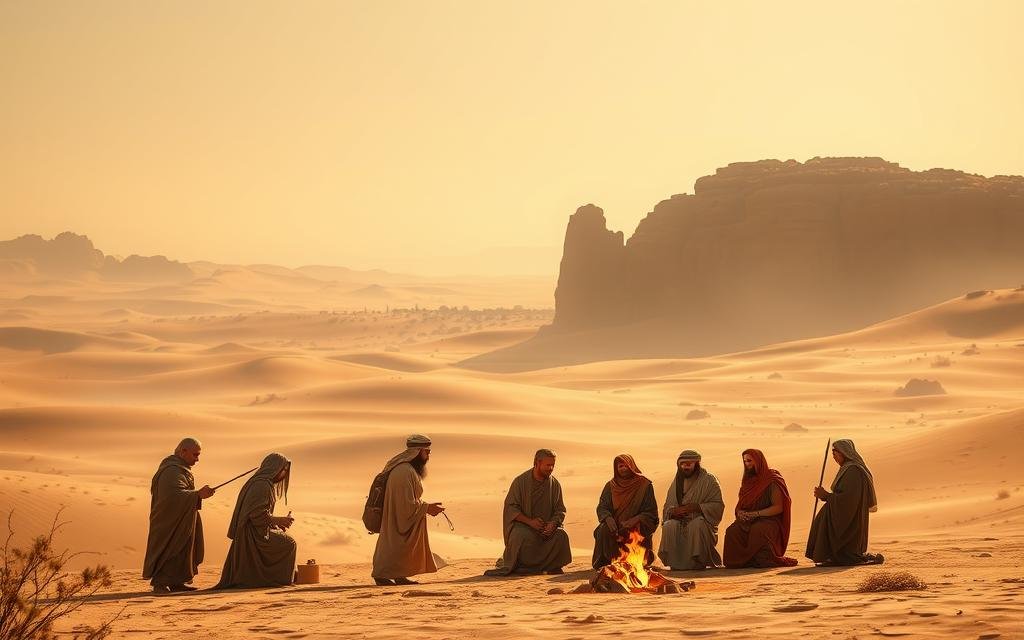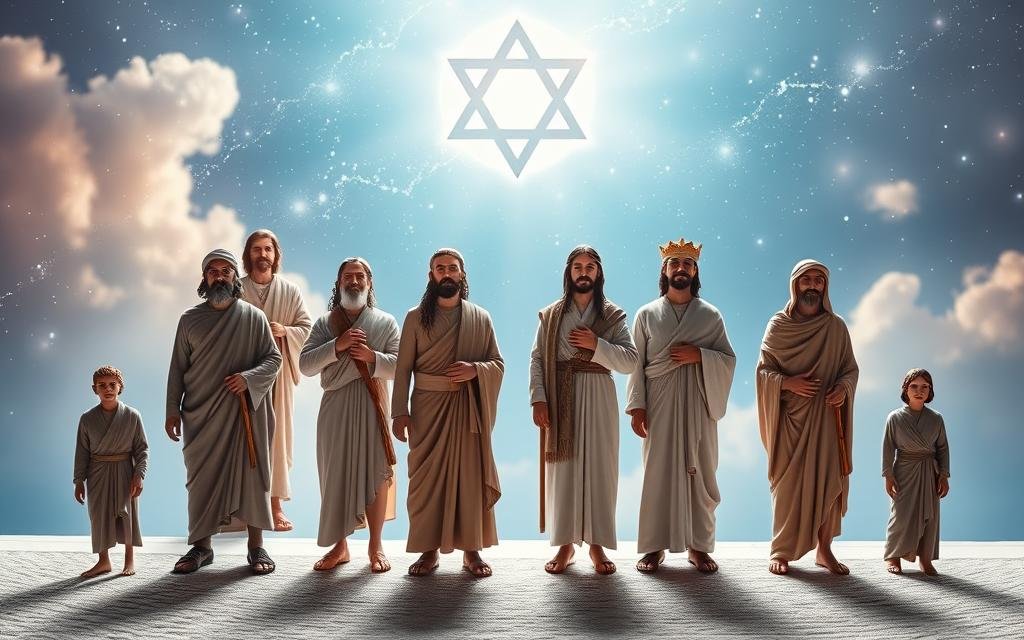What do the biblical tribes of Israel represent in the Judeo-Christian tradition?
The story of the Israelite tribes is deeply rooted in biblical history. It symbolizes the descendants of Jacob’s twelve sons. Knowing the twelve tribes list and their meanings gives us valuable insights.
Exploring the origins and meanings of these tribes helps us understand their importance. This journey aims to highlight the twelve tribes‘ role in the biblical story.
Why the Twelve Tribes Matter in the Bible
The Twelve Tribes of Israel are key in the Bible. They have a big role in history and faith. Knowing where they came from and why they matter is important.
A Quick Overview of Where the Twelve Tribes Came From
The Twelve Tribes started with Jacob’s twelve sons. God later named Jacob Israel. This is a big moment in the Bible.
It helps us understand the meaning of Israelite tribes and their place in God’s promise. Jacob’s sons and their families became the twelve tribes. They helped shape who the Israelites were.

Why Their Names Carry Spiritual and Historical Significance
The names of the twelve tribes mean a lot. They are not just labels. Each name shows something special about God’s bond with His people or a key event in the tribe’s history.
Learning about the significance of tribe names helps us see the Bible’s story better. It also shows what each tribe was like.
What Readers Will Learn from This Post
This article will teach you a lot about the Twelve Tribes of Israel. You’ll learn about their beginnings, the stories behind their names, and their part in the Bible’s history. By looking into tribe names and their meanings, you’ll discover the deep biblical tribe meanings. These meanings are important today in faith and culture.
Who Were the Twelve Tribes of Israel?
The Twelve Tribes of Israel came from Jacob’s twelve sons. They were key in God’s covenant. This is vital to grasp the Israelites’ history and identity.
The Twelve Sons of Jacob (Israel) and Their Role in God’s Covenant
Reuben, Simeon, Levi, Judah, Dan, Naphtali, Gad, Asher, Issachar, Zebulun, Joseph, and Benjamin were Jacob’s sons. They were born to Jacob and his wives, Leah and Rachel, and their handmaids, Bilhah and Zilpah.
Each son led a tribe. The Tribe of Reuben was known for its instability. The Tribe of Judah became a leader.
How the Tribes Formed the Foundation of Israel’s Identity
The tribes were at the heart of Israel’s society and faith. They were more than family groups. They held spiritual and historical importance.
Mention of Joseph’s Sons (Ephraim and Manasseh) and the Levites
Joseph’s sons, Ephraim and Manasseh, were special to Jacob. The Levites, from Levi, were priests. They served the Israelites’ religious needs.
This made them different. They didn’t have a territory but were spread among other tribes.
| Mother | Sons | Tribes |
|---|---|---|
| Leah | Reuben, Simeon, Levi, Judah, Issachar, Zebulun | Reubenites, Simeonites, Levites, Judahites, Issacharites, Zebulunites |
| Rachel | Joseph, Benjamin | Josephites (Ephraim and Manasseh), Benjaminites |
| Bilhah (Rachel’s handmaid) | Dan, Naphtali | Danites, Naphtalites |
| Zilpah (Leah’s handmaid) | Gad, Asher | Gadites, Asherites |

List of the Twelve Tribes of Israel with Names and Meanings
The Twelve Tribes of Israel are key to understanding the Bible. Each tribe has a name that means a lot. These names come from Jacob’s sons and tell us about their roles and Israel’s identity.
Here’s a breakdown of each tribe, their name meaning, and the corresponding Bible verse where their birth is recorded:
1. Reuben – “Behold, a Son”
📖 “It is because the Lord has seen my misery. Surely my husband will love me now.” —Genesis 29:32
Reuben was the firstborn of Jacob and Leah. His name reflects Leah’s deep longing for love and recognition. “Reuben” is a declaration of hope—“See, a son!”—implying that God had taken notice of her pain.
2. Simeon – “He Has Heard”
📖 “Because the Lord heard that I am not loved, he gave me this one too.” —Genesis 29:33
Simeon’s name reveals Leah’s belief that God had heard her affliction. It serves as a reminder that God listens to the cries of the unloved and shows compassion.
3. Levi – “Joined” or “Attached”
📖 “Now at last my husband will become attached to me, because I have borne him three sons.” —Genesis 29:34
With Levi, Leah hoped her husband would finally connect with her. The name Levi speaks of connection and unity—later, the Levites would be the tribe set apart for priestly service, spiritually “joined” to God’s work.
4. Judah – “Praise”
📖 “This time I will praise the Lord.” —Genesis 29:35
Judah’s name marks a turning point for Leah. Instead of focusing on her husband, she lifts her eyes to God in praise. Fittingly, Judah becomes the royal tribe, from which King David and Jesus Christ descend.
5. Dan – “Judge”
📖 “God has vindicated me; he has listened to my plea and given me a son.” —Genesis 30:6
Dan was born to Rachel’s maidservant Bilhah. Rachel saw his birth as a sign of God’s justice and favor in her struggle with infertility. “Dan” reflects divine judgment and vindication.
6. Naphtali – “My Struggle” or “Wrestling”
📖 “I have had a great struggle with my sister, and I have won.” —Genesis 30:8
Rachel named Naphtali to express the emotional and spiritual wrestling she experienced in her competition with Leah. His name captures the tension of human striving and the longing for victory.
7. Gad – “Good Fortune”
📖 “What good fortune!” —Genesis 30:11
Leah’s maidservant Zilpah bore Gad, and Leah celebrated the birth with joy. The name signifies blessing and abundance, a sense that God’s favor was resting upon her.
8. Asher – “Happy” or “Blessed”
📖 “How happy I am! The women will call me happy.” —Genesis 30:13
Asher’s name radiates joy. Leah saw his birth through Zilpah as a reason to celebrate. His tribe would later dwell in a fertile and rich land, reflecting the “blessed” nature of his name.
9. Issachar – “Reward” or “Hire”
📖 “God has rewarded me for giving my servant to my husband.” —Genesis 30:18
Issachar’s name reflects Leah’s sense of being rewarded by God. It points to the idea that God sees sacrificial acts and responds with blessing.
10. Zebulun – “Honor” or “Dwelling”
📖 “God has presented me with a precious gift. This time my husband will treat me with honor.” —Genesis 30:20
Zebulun’s birth was another attempt by Leah to gain Jacob’s affection, but his name also implies a higher dignity. “Zebulun” can mean “dwelling,” hinting at honor and establishment.
11. Joseph – “May He Add”
📖 “May the Lord add to me another son.” —Genesis 30:24
Rachel’s first biological son, Joseph, was born after years of barrenness. His name is a prayer for increase—both in family and in favor. Joseph’s life later exemplifies divine multiplication and purpose.
12. Benjamin – “Son of My Right Hand”
📖 “But his father named him Benjamin.” —Genesis 35:18
Originally named Ben-Oni (“son of my sorrow”) by Rachel as she died in childbirth, Jacob renamed him “Benjamin,” expressing strength and blessing. The “right hand” symbolizes power, favor, and closeness.
| Tribe | Meaning | Biblical Reference |
| Reuben | Behold, a son | Genesis 29:32 |
| Simeon | He has heard | Genesis 29:33 |
| Levi | Joined or Attached | Genesis 29:34 |
| Judah | Praise | Genesis 29:35 |
| Dan | He has judged | Genesis 30:6 |
| Naphtali | My struggle | Genesis 30:8 |
| Gad | Good fortune | Genesis 30:11 |
| Asher | Happy or blessed | Genesis 30:13 |
| Issachar | There is a reward | Genesis 30:18 |
| Zebulun | Dwelling or honor | Genesis 30:20 |
| Joseph | He will add | Genesis 30:24 |
| Benjamin | Son of the right hand | Genesis 35:18 |

The names of the Twelve Tribes tell us about their ancestors’ hopes, struggles, and faith. They add a rich layer of spiritual and historical meaning to the Bible.
Special Notes on Ephraim, Manasseh, and Levi
A closer look at the twelve tribes shows us Ephraim, Manasseh, and Levi. These tribes play big roles in the Israelite community. Their stories help us understand biblical history and spiritual themes.
Joseph’s Tribe Split into Two: Ephraim and Manasseh
Joseph’s family split into two tribes: Ephraim and Manasseh. This happened because Jacob adopted Joseph’s sons. This gave them a special place among the tribes (Genesis 48:5-6).
Ephraim means “fruitful,” and Manasseh means “forgetting” or “causing to forget.” Together, they make up two of the twelve tribes. This means Joseph’s family is represented twice.
The tribe of Ephraim was known for its strength and leadership. Manasseh was also strong and contributed a lot to the community. This split made sure Joseph’s family was blessed and important.
The Levites’ Special Priestly Role
The Levites had a special job as priests. They served the Lord and the community in religious ways. Their name, meaning “joined” or “attached,” shows they were attached to God’s service.
The Levites took care of the tabernacle, did sacrifices, and taught the law. They lived all over Israel, showing their important role in the community.
- The Levites took care of the tabernacle and its services.
- They taught the law and kept religious practices.
- Their homes all over Israel showed their key role in the community.
Learning about Ephraim, Manasseh, and Levi helps us see the twelve tribes better. We understand their roles in Israel’s history and spiritual heritage.
Spiritual Lessons from the Names of the Twelve Tribes
The Twelve Tribes’ names are more than just labels. They hold deep spiritual meanings that show God’s nature and plans. Each name gives us a special way to see God’s bond with Israel. It also teaches us valuable lessons for our lives.
God’s Relationship with His People
The names of the Twelve Tribes show different sides of God’s relationship with His people. For example, Reuben means “Behold, a son.” It shows God’s kindness. On the other hand, Simeon means “He has heard.” It shows God listens to His people’s prayers.
The table below summarizes the spiritual significance of the Twelve Tribes’ names:
| Tribe Name | Meaning | Spiritual Significance |
|---|---|---|
| Reuben | Behold, a son | God’s gracious provision |
| Simeon | He has heard | God’s attentiveness to His people’s cries |
| Levi | Joined or Attached | Devotion and service to God |
| Judah | Praise | Leadership and worship |
Lessons on Identity, Purpose, and Calling
The names of the Twelve Tribes teach us about identity, purpose, and calling. They tell us our identities come from God’s plans. Our callings are linked to our bond with Him. By studying these names, we learn more about our roles in God’s story.
Key Takeaways:
- The tribal names reflect God’s character and purposes.
- Understanding these names can deepen our understanding of our identity and calling.
- The names serve as a reminder of God’s faithfulness and interaction with His people.
Where Are the Twelve Tribes Mentioned in the Bible?
The Twelve Tribes are talked about in many important parts of the Bible. These parts help us understand their roles and why they are important in biblical history.
Genesis 49 – Jacob’s Blessings Over His Sons
In Genesis 49, Jacob blesses his twelve sons. He gives them prophetic insights into their futures. This chapter is key for knowing the traits and futures of the Twelve Tribes.
Genesis 49:3-4 talks about Reuben and his lack of stability. Genesis 49:8-12 praises Judah, saying he will lead.
Numbers 1 and 2 – Tribal Arrangement Around the Tabernacle
The books of Numbers 1 and 2 show how the Israelites were set up around the tabernacle. The Twelve Tribes were placed in a special order, with the Levites in the middle. This setup showed God’s people’s unity and order.
Each tribe had its own spot. The census in Numbers 1 and the setup in Numbers 2 highlight each tribe’s role in the community.
Revelation 7 – Tribes Mentioned Prophetically in the End Times
In the New Testament, Revelation 7 talks about the Twelve Tribes in the end times. It says 144,000 servants of God, 12,000 from each tribe, are sealed before a big trouble. This shows the tribes’ ongoing importance in God’s plan.
The mentions of the Twelve Tribes in Genesis, Numbers, and Revelation show their lasting importance. These parts of the Bible give us history and spiritual lessons about God’s relationship with His people.
Conclusion – Remembering the Legacy of the Twelve Tribes
The Twelve Tribes of Israel show God’s faithfulness over time. Their stories in the Bible are not just old tales. They are full of spiritual meaning that touches believers today.
The tribes show God’s faithfulness through generations
The history of the Twelve Tribes proves God’s constant love for His people. Even when they made mistakes, God stayed true. God’s faithfulness to the Twelve Tribes reminds us of His lasting love and promise.
Their names remind us of God’s promises, purposes, and plans
The names of the Twelve Tribes tell us about God’s promises and plans. Each name points to the spiritual and historical context of their time. They show us God’s relationship with His people.
It teaches us to trust God’s faithfulness. It also helps us understand our role in God’s story.
Reflect on Your Spiritual Identity in God’s Family
Exploring the Twelve Tribes of Israel shows us God’s bond with His people. It makes us think about our spiritual identity. We see how it ties to God’s big story.
Discovering Personal Significance in Biblical Names
Think about how your name and purpose link to God’s story. The Twelve Tribes’ names show their identity and mission. Our names and life stories also hold spiritual meaning, guiding us with God.
Deepening Your Understanding through Biblical Study
To learn more about your spiritual identity and God’s story, study the Bible. Use sites like the Bible Gateway or apps like YouVersion. Sharing what you learn can build community and deepen your faith.
Reflecting on our spiritual identity and studying the Bible strengthens our bond with God. It also connects us to others.







